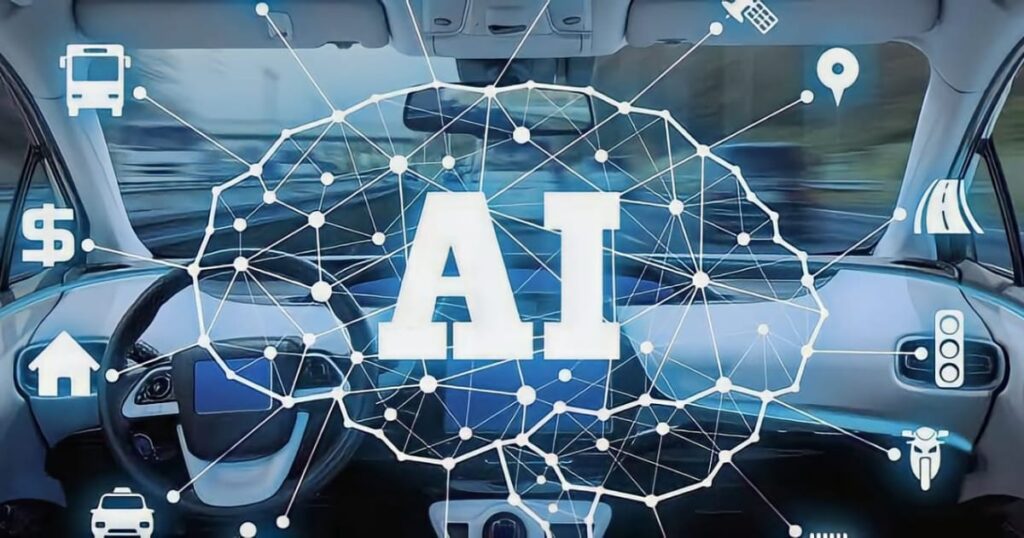Role of Artificial Intelligence (AI) in Cars
Introduction
Artificial Intelligence raises to the replication of human intelligence in machines, enabling them to perform tasks that typically need human perception. In the automotive industry, AI is revolutionizing the way cars operate, making them more independent, efficient, and connected. Let’s delve deeper into the evolution of AI in cars and its various applications.
Development of AI in Cars
The combination of AI in cars can be traced back to early applications, such as anti-lock braking systems (ABS) and electronic constancy control (ESC). These systems utilized AI algorithms to improve vehicle safety by analyzing sensor data and correcting braking and steering inputs. However, recent progresses have taken AI in cars to a whole new level.
Furthermore, the development of independent vehicles has pushed the boundaries of AI in cars. Self driving cars operate a complex network of sensors, cameras, and AI algorithms to perceive their surrounds, make decisions, and steer safely without human intervention. Companies like Tesla and Waymo have made important strides in autonomous driving, thanks to AI’s capabilities.
Enhancing Safety and Security
One of the main benefits of AI in cars is the development in safety and security features. AI-powered collision avoidance systems play a crucial role in preventing accidents. By continuously monitoring the environment and analyzing sensor data, these systems can classify potential crash risks and provide warnings or even interfere to avoid accidents.
Driver Tiredness Monitoring System is a safety feature forecast and identify situations where a driver is drowsy and tired and alert those drivers so that they can pull over to the side of the road and take other necessary steps to guarantee their and others care.
Adaptive Cruise Control is another safety feature sanctioned by AI. By using sensors to quantity the distance and speed of cars ahead, AI algorithms can automatically adjust the car’s speed to uphold a safe distance, reducing the risk of rear-end collisions.
AI is also playing a significant role in attractive the security of vehicles. Keyless entry systems using biometric authentication, such as facial recognition or fingerprint scanning, help prevent unauthorized access. Moreover, AI algorithms can notice and raise alerts for distrustful activities, such as attempted theft or vandalism.
Educating Driver Experience
In addition to safety improvements, AI is converting the driver experience inside the car. Natural language dispensation and voice recognition technologies enable drivers to interact with their cars using voice commands. Drivers can make handsfree phone calls, control music playback, adjust climate settings, and even get real-time traffic updates without taking their hands off the steering wheel.
AI-assisted navigation systems and automated parking systems are becoming a common feature in modern cars. By examining real-time traffic data, historic patterns, and user preferences, these systems can provide optimized route suggestions, saving time and sidestepping congestion. Furthermore, AI can integrate with existing navigation systems to offer modified references for nearby restaurants, gas stations, charms and parking spaces.
Modified driving preferences are another aspect where AI in demand. Modern cars equipped with AI algorithms can learn and adapt to distinct driving styles, automatically adjusting factors like seat position, mirror alignment, and climate control settings to provide a tailored driving experience for each driver.
AI and Fuel Efficiency
AI-optimized route planning is another way to save fuel. By analyzing real-time traffic data, historical patterns, and fuel consumption models, AI algorithms can suggest the most fuel-efficient routes for drivers. These routes may consider factors like traffic congestion, road inclinations, and fuel station locations, helping drivers minimize fuel consumption during their journeys.
Eco driving support is yet another application of AI in promoting fuel efficiency. AI algorithms can provide real-time feedback and guidance to drivers, encouraging actions like smooth hastening, continuing optimal speeds, and minimizing abrupt braking. By adopting eco-driving practices, drivers can reduce fuel consumption and contribute to a greener environment.
Challenges and Restrictions
While AI holds immense potential in the automotive industry, several challenges and limits need to be addressed. Ethical thoughts and liability are critical concerns when it comes to autonomous vehicles. Defining who is accountable in the event of accidents or system failures becomes complex when AI is involved. Striking the right balance between human oversight and AI executive is vital.
Data privacy and security are also significant concerns. AI systems in cars rely on vast amounts of data, including personal information and driving patterns. Safeguarding this data from unauthorized access or misuse is paramount. Automotive companies need to invest in robust security measures to protect user privacy and prevent cyberattacks.
Moreover, the adoption of AI in cars faces barriers related to public acceptance and trust. Some individuals may have reservations about surrendering control to AI driven systems, particularly in fully independent vehicles. Building awareness, demonstrating safety, and speaking public concerns are crucial for wider receipt and acceptance.
Upcoming Trends and Options
Looking ahead, the role of AI in cars will continue to evolve and expand. The development of fully autonomous vehicles is expected to progress further, with AI playing a central role in navigation, decision-making, and ensuring passenger safety. The integration of AI with smart cities and infrastructure will enable cars to communicate with traffic signals, parking systems, and other vehicles, facilitating smoother and more efficient journeys.
AI-driven car customization and personalization will become more prevalent. From interior ambiance lighting that adjusts to driver moods to personalized seat configurations based on individual preferences, AI algorithms will enable cars to adapt to their occupants’ unique needs and preferences.
Moreover, AI’s impact on the job market in the automotive industry will be significant. While certain job roles may become obsolete or transform due to automation, new opportunities will arise in AI development, data analysis, cybersecurity, and customer experience management. It is essential for professionals in the automotive sector to embrace AI and upskill accordingly.
Conclusion
Artificial Intelligence is developing the automotive industry, authorizing cars with progressive capabilities and transforming the driving knowledge. From enhancing safety and security to educating fuel efficiency and personalization, AI is driving the future of cars. As technology continues to evolve, the potentials are boundless, paving the way for safer, more effective, and intelligent cars on our highways.


